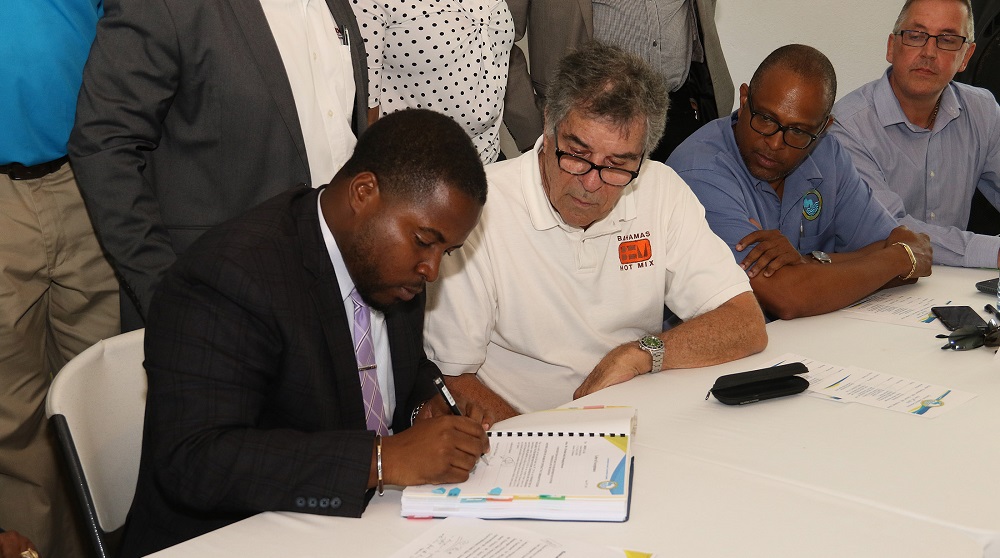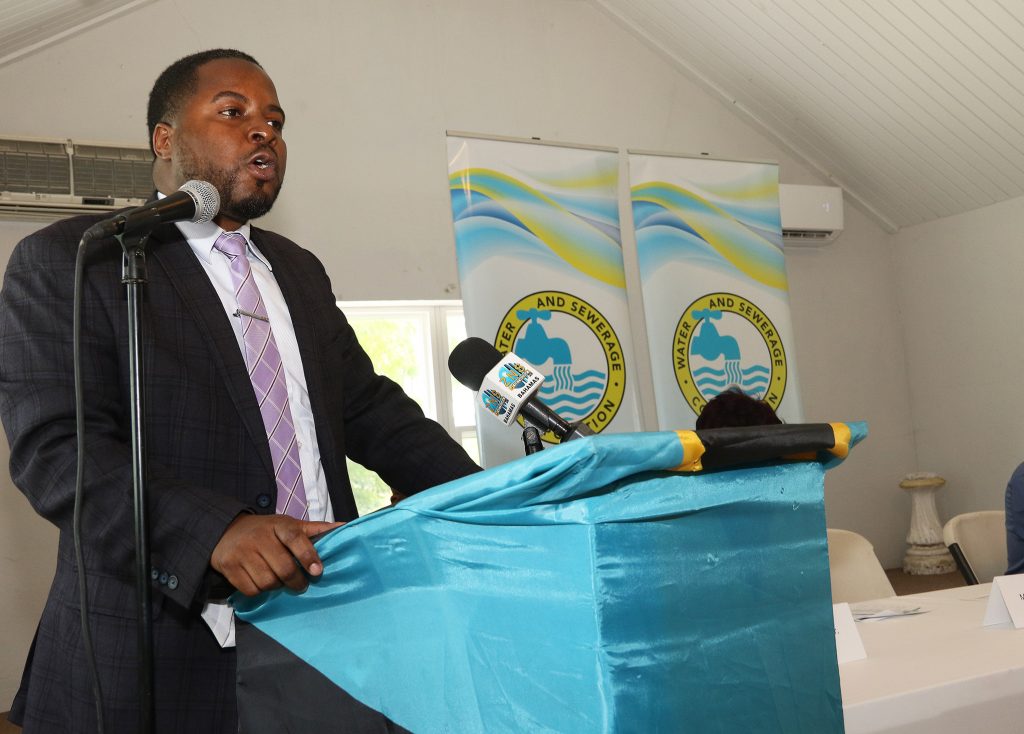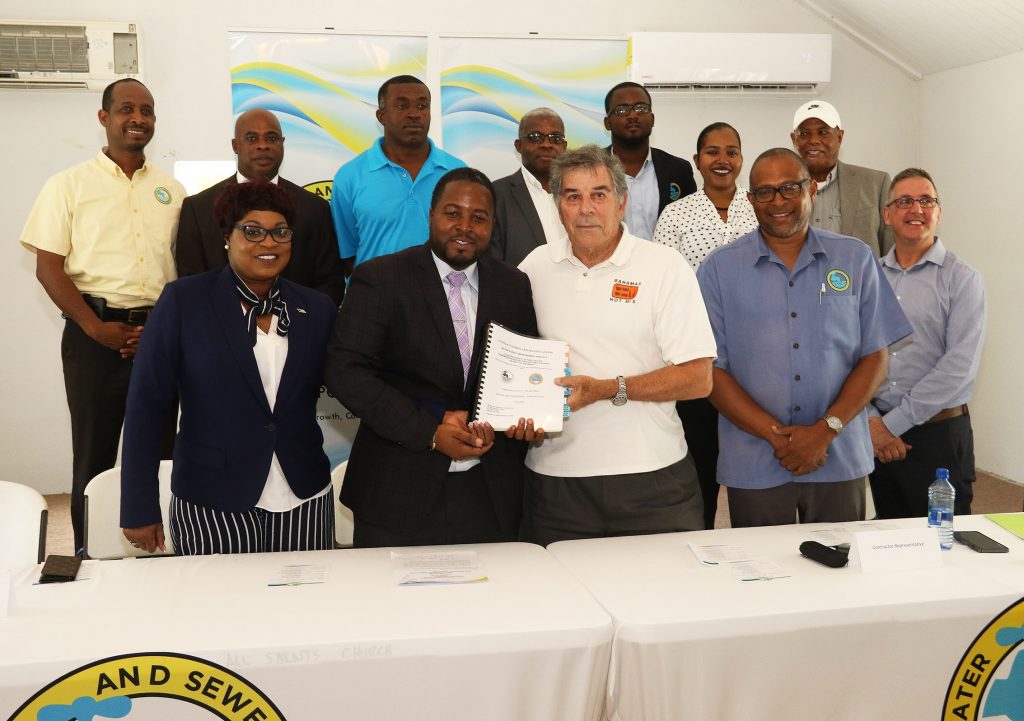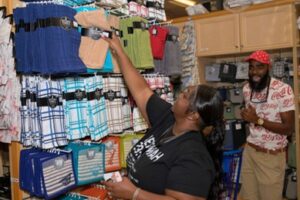Crooked Island, June 20, 2019 – Bahamas – Residents of Crooked Island clapped their hands gleefully and burst forth exclamations of praise during the contract signing ceremony to supply potable water for the first time in several settlements on this remote island.
Water and Sewerage Corporation
(WSC) Executive Chairman and MP for Long Island, Adrian Gibson led a small
delegation to this southern island Tuesday, June 18, 2019 and signed a contract
totaling $1,911,650.46 with Peter Andrews, Chairman, Bahamas Hot Mix (BHM) at
Ezekiel Thompson Hall in Cabbage Hill.
The delegation included Miriam
Emmanuel, MP for MICAL and Chairman, Education Loan Authority; Elwood
Donaldson, General Manager, WSC; Robert Deal, Deputy General Manager; Cyprian
Gibson, Assistant General Manager, WSC; Bennett Minnis, WSC board member; Karl
McIntosh, N.O Whyte and Associates Ltd.; other representatives of WSC and BHM. Leonard Dames Jr., Administrator; Local
Government practitioners including David Daxon, Chief Councilor, leaders of
religious organizations and other residents of the island attended the
ceremony.
The project is a part of the
$28.33 million loan from the Caribbean Development Bank and $13.3 million in
counterpart funding from the Bahamas Government, and is expected to supply
water to the Pond Road, Timothy Thompson Settlement, Church Grove Settlement
and Colonel Hill Settlement. It covers
approximately 18,850 feet of 4-inch PVC pipe, approximately 5,800 feet of
2-inch PVC pipe and 83 water service connections. The work is expected to be
completed in approximately 8 months.
Local residents of Crooked
Island are expected to be employed on the project that also offers
opportunities for females to work as required by CDB terms.
Mr. Andrews said skilled
operators are needed but the majority of hires will be trained on the job.
The program comprises two
projects in New Providence and projects on six Family Islands including Crooked
Island.
In his remarks, WSC Chairman,
expressed excitement as the government provides a potable water distribution to
Crooked Island.
“We recognize that all of Crooked
Island will not benefit from this initial project but this government is
committed to providing the entire island with a potable water system; so we
intend to expand the system as far and as fast as the budget will allow,” said
Mr. Gibson.
He responded to some of the
concerns expressed by Mr. Daxon, on behalf of the residents, in his welcome.
“I understand his passion,” said
Mr. Gibson. “I feel the same way about my island. The corporation will also be
purchasing a Reverse Osmosis plant to address your concerns because of water
production.
“Limited budgets can only do
some things at a time. Start at one point and over time you build on that until
you get to where you want to be. I agree, access to potable water is a
universal right. All of these islands should have potable water. It is
unfortunate that it happened. We’re doing our best to address it. He who feels it knows it.”
Mr. Gibson remarked that because
The Bahamas is located in a hurricane zone the proposed water systems have been
designed so that they are robust to climate variability and climate change. He
said engineers have identified potential climate change impacts along with the
appropriate adaptation measures.
He explained that pipelines
along roadways which are adjacent to the sea will be laid at a depth of 4 feet,
rather than the standard 3 feet and will be installed on the opposite side of
the roadway from where the sea is.
Studies have been carried out to
identify areas that would be under water if Crooked Island is impacted by a
storm of high intensity.
Mr. Gibson expressed thanks to
the Hon. Desmond Bannister, Minister of Public Works; and to the Most Hon.
Prime Minister Hubert Minnis for their support. He also acknowledged the
following: the CDB, Julius Bonaby and the
staff of the Family Island Department of WSC in Crooked Island; engineers in
the Project Management Unit; and N.O. Whyte and Associates for their technical
assistance and project management.
He assured residents in the
Family Islands that the government will do everything in its power to ensure a
safe and reliable water supply to residents.
“This government is keenly aware of the needs in the various Family Islands and we are currently formulating plans to address them,” he said.
By Kathryn Campbell
Release: BIS
Photo Captions:
Header:
First Insert:
Second Insert:
PHOTO CAPTIONS
6680
Adrian Gibson, Executive
Chairman, Water and Sewerage Corporation and MP for Long Island speaks at a
Contract Signing ceremony in Crooked Island, June 18, 2019. (BIS Photo/Patrick Hanna)
6706(1)
Adrian Gibson, Executive
Chairman, Water and Sewerage Corporation (WSC) and MP for Long Island signs the
contract as Peter Andrews, Chairman, Bahamas Hot Mix (BHM), looks on, June 18,
2019. Also shown is Elwood Donaldson,
General Manager, WSC and Paul Huckle, Commercial Manager, BHM. (BIS Photo/Patrick Hanna)
6711
Adrian Gibson, WSC Executive
Chairman and MP for Long Island, is shown holding contract with Peter Andrews,
Chairman, BHM. Also shown from left in
the first row: Miriam Emmanuel, MP for MICAL and Chairman, Education Loan Authority;
Elwood Donaldson, General Manager, WSC. From left in back row: Cyprian Gibson,
Assistant General Manager; Leonard Dames, Administrator; David Daxon, Chief
Councilor; Karl McIntosh, N.O Whyte and Associates Ltd; Ashton Symonette and
Ayla Isaacs, Project Management Unit; Bennett Minnis, Board Member and Paul
Huckle, BHM.
(BIS Photo/Patrick Hanna)




 News3 days ago
News3 days ago
 TCI News5 days ago
TCI News5 days ago















